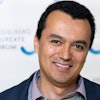Dr. Natalia Rodriguez
Title: Assistant Professor, Department of Public Health and Weldon School of Biomedical Engineering, Purdue University; Associate Director of Population Health and Health Equity, Regenstrief Center for Healthcare Engineering
Age: 35
Education: B.S., chemical engineering, Massachusetts Institute of Technology; B.S., biology, Massachusetts Institute of Technology; M.S., engineering, the University of Pennsylvania; Ph.D., biomedical engineering, Boston University; and M.P.H., global health, Harvard T. H. Chan School of Public Health
Career mentors: Catherine Klapperich, Boston University; Adriana Velazquez Berumen, World Health Organization; and Erin Kobetz, University of Miami
Words of encouragement/wisdom: Be very intentional about what you choose to take on and how you choose to spend your time. Remember that ‘No’ is a complete sentence.
As a biomedical engineer focused on community healthcare, Dr. Natalia Rodriguez, assistant professor of public health and biomedical engineering at Purdue University, has turned her distinguished scientific background toward addressing issues such as homelessness, cancer, and HIV in underserved communities.
With five STEM degrees collectively from MIT, the University of Pennsylvania, Boston University, and Harvard University, and an abundance of refereed publications and grant-supported research, Rodriguez has chosen to focus on community-based, action-oriented projects.
They include developing a rapid diagnostic screening test for cervical cancer and building partnerships between the community and academia to address housing inequities and the impact of COVID-19 on people experiencing homelessness.
Rodriguez is “a scholar who exemplifies excellence in research, community engagement, and teaching,” wrote Dr. Marion Underwood, dean of Purdue’s College of Health and Human Services, in nominating Rodriguez to become a 2023 Emerging Scholar.
“Engineers generally want to make cool new technologies and oftentimes they don’t really go anywhere,” Rodriguez said. “They never leave the lab to actually help people because the technologies are often disconnected from real world needs.” She adds that she has sought “to design technologies that are meant to bridge those gaps in access to care.”
Rodriguez’s primary research project is supported by a five-year National Institutes of Health-National Cancer Institute Mentored Research Scientist Development (NIH-NCI K01) award and focuses on the development of a rapid diagnostic test for human papillomavirus, or HPV, to enable community-based screening for cervical cancer. Additionally, in 2019, Rodriguez received an NIH/NCI Mentored Research Scientist Career Development Award, and she was awarded numerous other honors and grants dating back to her time at MIT, where she received three undergraduate research grants and awards. In 2021, she received Purdue’s Award for Exceptional Teaching and Instructional Support during the COVID-19 Pandemic.
Rodriguez’s research combines three major areas of work: 1.) community-based participatory research in underserved communities; 2.) human-centered design of health technologies; and 3.) training of community health workers in various aspects of the procedures. Rodriguez is applying this model to inform the implementation of a rapid HIV test for people who inject drugs.
“I work to bring health technologies from the lab to the people, and I also work to bring the needs, the priorities and the strengths of communities back to engineers so they know who they’re designing for,” Rodriguez said. “This bi-directional dialogue, I think, has made for better technologies because we’re co-designing these things now with communities in need of them.”
Underwood points out that Rodriguez co-developed a graduate global health course, an undergraduate pandemics course and an Honors College course on engineering health, and she “actively mentors” an interdisciplinary team of graduate and undergraduate researchers.
It’s this work that Rodriguez said will be part of her future academic endeavors. “I have a team of undergraduate and graduate students who are all interested in addressing health disparities. … So, I think where I go from here is mentoring the next generation of people who can think across disciplines and work with different kinds of scientists.”
As for her own research, “The next step, the dream, is … developing the next generation of that cervical cancer test in ways that involve community health workers, homeless individuals, community organizations and health clinics,” she said. And over the long term, she plans to “keep on keeping on, keep engaging communities in meaningful ways, having them [play] a key role in designing their own health interventions and technologies and preaching about this to engineers who are starting to get it and who are starting to understand human-centered design.”















